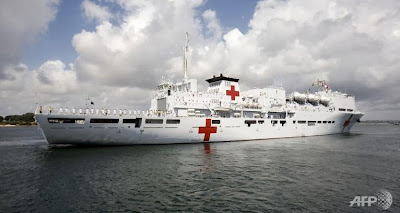China should send warships to aid the typhoon-hit Philippines and counter US and Japanese influence, state-run media said on Friday, as Beijing comes in for criticism for its relatively meagre donation to the stricken nation.
The call came after China said on Thursday it would provide a further US$1.6 million aid to the Philippines, mainly in tents and blankets, following condemnation of its initial response of a US$100,000 government donation, matched by the Chinese Red Cross.
Even the expanded donation was less than that of Swedish furniture group Ikea, whose charitable foundation is giving UN children's agency Unicef US$2.7 million for its relief efforts.
Beijing and Manila are embroiled in a row over disputed islands. But China's Global Times said in an editorial that if the Philippines rejected the warships proposal, that would only "underscore its narrow mind and will be of no loss to China".
An eight-strong flotilla of US vessels, headed by the aircraft carrier USS George Washington, has arrived off the Philippines bearing badly needed equipment, supplies and expertise for the thousands left homeless and hungry by one of the strongest storms in history.
Japan is tripling its emergency aid package for the Philippines to more than US$30 million, and plans to send as many as 1,000 troops to the disaster zone -- the largest single relief operation team sent abroad by its de-facto military.
"We believe China should send its warships to the Philippines too," said the Global Times, which is close to the Chinese Communist Party, adding such a move would be "well-intentioned".
Beijing's initial financial response to the disaster was met with disgust, with US magazine Time carrying a report on Wednesday under the headline: "The world's second largest economy off-loads insultingly small change on a storm-battered Philippines."
Michael Valderrama, a columnist with the Sun Star Daily in the Philippines, wrote: "China should realise that this isn't about politics any more -- it's about basic human decency.
"The Philippines and China aren't exactly best buddies, but we're not sworn enemies either," he added.
"If bitter enemies like Pakistan and India or Japan and North Korea can give each other appropriate aid and funding in times of need, then why can't the Chinese just give a little bit more instead of tossing a few dollars at us like we're a beggar that they want to shoo away?"
The territorial dispute over islands in the strategically vital South China Sea -- which Beijing claims almost in its entirety -- has been running for years.
Manila says Chinese vessels have occupied Scarborough Shoal, which it claims itself, since last year, and it is open to question whether it would welcome a Chinese navy presence in its waters.
The US and Japanese militaries' part in the relief efforts is an element of Washington's Asia strategy and may have "more intentions hidden behind the humanitarian aid", the Global Times said in a separate report.
Beijing could send a hospital ship, the Peace Ark, escorted by warships if dispatching its newly commissioned aircraft carrier the Liaoning was "sensitive and premature", said the editorial.
China's foreign ministry disassociated the authorities from Friday's editorial, with spokesman Hong Lei telling reporters at a regular briefing: "The relevant op-ed represents the opinion of the media itself.
"As for in what way and how much (further aid should be provided), China will make relevant decision in accordance with the development of the situation as well as the requirement of the Philippine side," he added.
The Global Times editorial, which was similar in both the paper's English- and Chinese-language editions, said Beijing was cautious about sending troops overseas in the past because of "a lack of capabilities, experience and many other concerns".
But now, it said: "The Chinese military must gradually assume a more forceful role in China's diplomacy.
"There is no need for a stronger China to worry about what we should do if our offer is rejected by the Philippines or if we are criticised by global public opinion due to poor performance," it added. -Channel News Asia


No comments:
Post a Comment